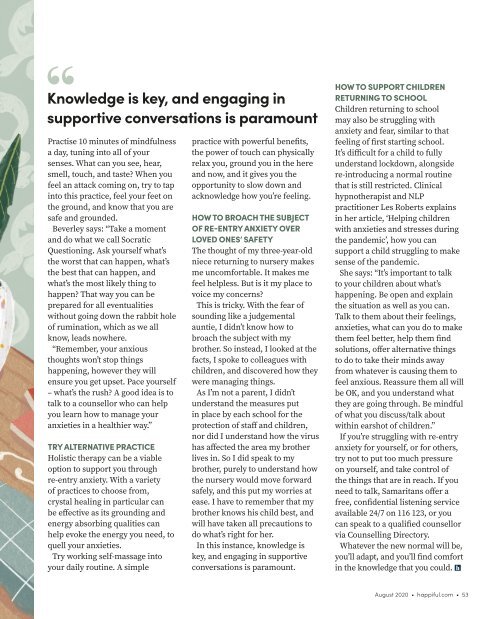Happiful August 2020
Create successful ePaper yourself
Turn your PDF publications into a flip-book with our unique Google optimized e-Paper software.
Knowledge is key, and engaging in<br />
supportive conversations is paramount<br />
Practise 10 minutes of mindfulness<br />
a day, tuning into all of your<br />
senses. What can you see, hear,<br />
smell, touch, and taste? When you<br />
feel an attack coming on, try to tap<br />
into this practice, feel your feet on<br />
the ground, and know that you are<br />
safe and grounded.<br />
Beverley says: “Take a moment<br />
and do what we call Socratic<br />
Questioning. Ask yourself what’s<br />
the worst that can happen, what’s<br />
the best that can happen, and<br />
what’s the most likely thing to<br />
happen? That way you can be<br />
prepared for all eventualities<br />
without going down the rabbit hole<br />
of rumination, which as we all<br />
know, leads nowhere.<br />
“Remember, your anxious<br />
thoughts won’t stop things<br />
happening, however they will<br />
ensure you get upset. Pace yourself<br />
– what’s the rush? A good idea is to<br />
talk to a counsellor who can help<br />
you learn how to manage your<br />
anxieties in a healthier way.”<br />
TRY ALTERNATIVE PRACTICE<br />
Holistic therapy can be a viable<br />
option to support you through<br />
re-entry anxiety. With a variety<br />
of practices to choose from,<br />
crystal healing in particular can<br />
be effective as its grounding and<br />
energy absorbing qualities can<br />
help evoke the energy you need, to<br />
quell your anxieties.<br />
Try working self-massage into<br />
your daily routine. A simple<br />
practice with powerful benefits,<br />
the power of touch can physically<br />
relax you, ground you in the here<br />
and now, and it gives you the<br />
opportunity to slow down and<br />
acknowledge how you’re feeling.<br />
HOW TO BROACH THE SUBJECT<br />
OF RE-ENTRY ANXIETY OVER<br />
LOVED ONES’ SAFETY<br />
The thought of my three-year-old<br />
niece returning to nursery makes<br />
me uncomfortable. It makes me<br />
feel helpless. But is it my place to<br />
voice my concerns?<br />
This is tricky. With the fear of<br />
sounding like a judgemental<br />
auntie, I didn’t know how to<br />
broach the subject with my<br />
brother. So instead, I looked at the<br />
facts, I spoke to colleagues with<br />
children, and discovered how they<br />
were managing things.<br />
As I’m not a parent, I didn’t<br />
understand the measures put<br />
in place by each school for the<br />
protection of staff and children,<br />
nor did I understand how the virus<br />
has affected the area my brother<br />
lives in. So I did speak to my<br />
brother, purely to understand how<br />
the nursery would move forward<br />
safely, and this put my worries at<br />
ease. I have to remember that my<br />
brother knows his child best, and<br />
will have taken all precautions to<br />
do what’s right for her.<br />
In this instance, knowledge is<br />
key, and engaging in supportive<br />
conversations is paramount.<br />
HOW TO SUPPORT CHILDREN<br />
RETURNING TO SCHOOL<br />
Children returning to school<br />
may also be struggling with<br />
anxiety and fear, similar to that<br />
feeling of first starting school.<br />
It’s difficult for a child to fully<br />
understand lockdown, alongside<br />
re-introducing a normal routine<br />
that is still restricted. Clinical<br />
hypnotherapist and NLP<br />
practitioner Les Roberts explains<br />
in her article, ‘Helping children<br />
with anxieties and stresses during<br />
the pandemic’, how you can<br />
support a child struggling to make<br />
sense of the pandemic.<br />
She says: “It’s important to talk<br />
to your children about what’s<br />
happening. Be open and explain<br />
the situation as well as you can.<br />
Talk to them about their feelings,<br />
anxieties, what can you do to make<br />
them feel better, help them find<br />
solutions, offer alternative things<br />
to do to take their minds away<br />
from whatever is causing them to<br />
feel anxious. Reassure them all will<br />
be OK, and you understand what<br />
they are going through. Be mindful<br />
of what you discuss/talk about<br />
within earshot of children.”<br />
If you’re struggling with re-entry<br />
anxiety for yourself, or for others,<br />
try not to put too much pressure<br />
on yourself, and take control of<br />
the things that are in reach. If you<br />
need to talk, Samaritans offer a<br />
free, confidential listening service<br />
available 24/7 on 116 123, or you<br />
can speak to a qualified counsellor<br />
via Counselling Directory.<br />
Whatever the new normal will be,<br />
you’ll adapt, and you’ll find comfort<br />
in the knowledge that you could.<br />
<strong>August</strong> <strong>2020</strong> • happiful.com • 53

















